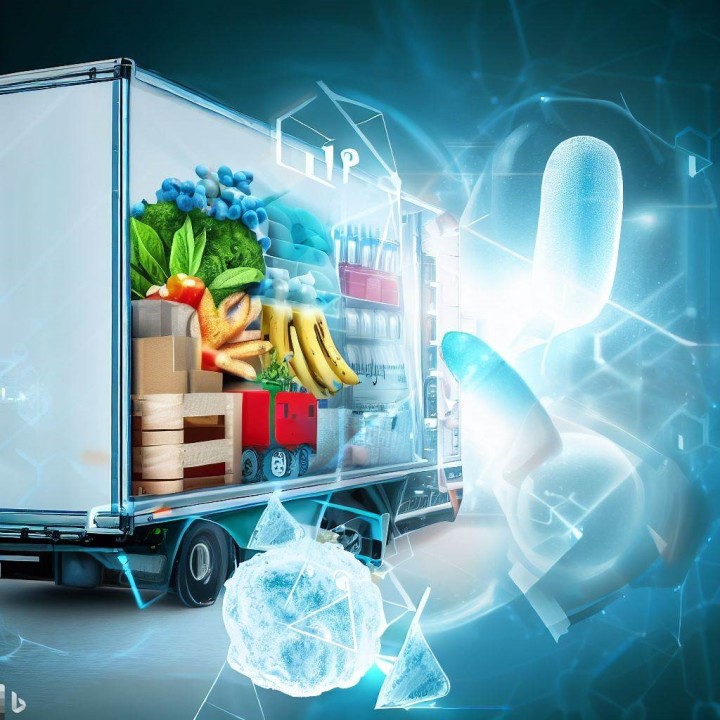The Role of IoT in Modern Logistics: How Smart Devices Improve Supply Chains

What is IoT in logistics?
The Internet of Things refers to the network of interconnected devices that collect and share data across systems without the need for human intervention. In the logistics industry, this includes everything from smart sensors on shipping containers and delivery vehicles to automated warehouse systems.
For example, when high-value goods are being transported, IoT sensors enable the monitoring of temperature, location, and condition in real-time. If any deviations occur—such as temperature changes or route deviations—logistics managers are alerted immediately, allowing quick action to prevent damage or delays.
This kind of technology improves the efficiency of logistics operations while offering customers transparency over their shipments. The result is a smoother, more reliable supply chain that enhances trust between service providers and clients.
Key Benefits of IoT in Logistics:
Real-Time Tracking and Monitoring: Real-time tracking is one of the most significant advantages IoT brings to logistics. Sensors can be embedded in vehicles, containers, or even individual products, allowing for constant updates on location and condition. This eliminates the need for manual tracking and allows logistics companies to make quick, data-driven decisions to optimize delivery routes or avoid delays.
With these tools, it’s possible to give clients accurate delivery time predictions, improving overall customer satisfaction.
Predictive Maintenance for Vehicles and Equipment :Maintenance delays are costly in logistics, but IoT can solve this by providing real-time insights into the health of vehicles and equipment. By monitoring metrics such as engine temperature, fuel consumption, and tire pressure, IoT devices can predict when maintenance is needed before any breakdown occurs.
This proactive approach helps logistics companies avoid unexpected downtime, reducing repair costs and keeping operations running smoothly.
Enhanced Warehouse Efficiency: Warehousing is another area where IoT delivers exceptional value. Smart sensors within warehouses can monitor inventory levels, track stock movements, and even guide employees through the most efficient picking and packing processes.
By automating inventory tracking, companies can eliminate human errors, better manage space, and ensure stock levels are always optimized to meet demand. This automation leads to faster processing times and more efficient use of resources.
Optimized Delivery Routes and Reduced Fuel Consumption: GPS-enabled IoT devices can monitor traffic, road conditions, and vehicle performance to help logistics companies reroute vehicles on the fly. By avoiding congested areas or hazardous conditions, IoT technology reduces fuel consumption and shortens delivery times.Optimized routes not only save money but also help companies reduce their carbon footprint, contributing to sustainability efforts.
Improved Security and Asset Management: Security is crucial in logistics, especially when transporting high-value goods. IoT enhances security by enabling real-time asset tracking. Geofencing allows companies to set virtual boundaries for shipments—if a shipment deviates from its path, alerts are triggered, ensuring quick action.This provides peace of mind for companies and clients alike, knowing that assets are being closely monitored and secured throughout the supply chain.
Real-World Applications of IoT in Logistics:
Cold Chain Monitoring: Temperature-sensitive goods like pharmaceuticals or food products require constant environmental control during transportation. IoT temperature sensors help ensure these goods remain within the correct conditions, alerting managers when deviations occur. This technology has reduced the spoilage of perishable goods and improved the reliability of cold-chain logistics.
Automated Inventory Management: In large warehouses, manual inventory management can be inefficient and prone to errors. IoT sensors automatically track product movements and stock levels, allowing companies to maintain the perfect balance between overstocking and stock shortages. This automation streamlines warehouse operations and reduces the risk of human error.
Challenges of IoT Implementation in Logistics:
While the benefits of IoT are significant, companies face several challenges when implementing this technology.
Data Security and Privacy: With the vast amount of data generated by IoT devices, data security is a critical concern. Companies must invest in robust cybersecurity measures to protect sensitive information and prevent unauthorized access to their networks.
Initial Investment Costs: Deploying IoT systems requires a significant upfront investment. The cost of sensors, software, and integrating these devices with existing systems can be high. For smaller logistics companies, this may be a barrier to adoption, although the long-term benefits often outweigh the initial costs.
Integration with Legacy Systems: Many logistics companies still rely on legacy systems that are not easily compatible with modern IoT technology. Integrating new devices into these older systems can be complex and time-consuming, requiring specialized expertise.
However, with expert guidance, companies can overcome these challenges and successfully implement IoT into their supply chains, reaping the benefits of greater transparency and efficiency.
Conclusion:
The Internet of Things is undoubtedly revolutionizing logistics by providing real-time insights and automation that streamline operations and reduce costs. From real-time tracking to predictive maintenance, the potential benefits are immense for companies that embrace this technology.
As IoT technology continues to evolve, logistics companies will be able to offer even greater precision, security, and customer satisfaction in their operations. By leveraging IoT, we aim to remain at the forefront of modern logistics, always striving for more efficient, transparent, and customer-focused solutions.


